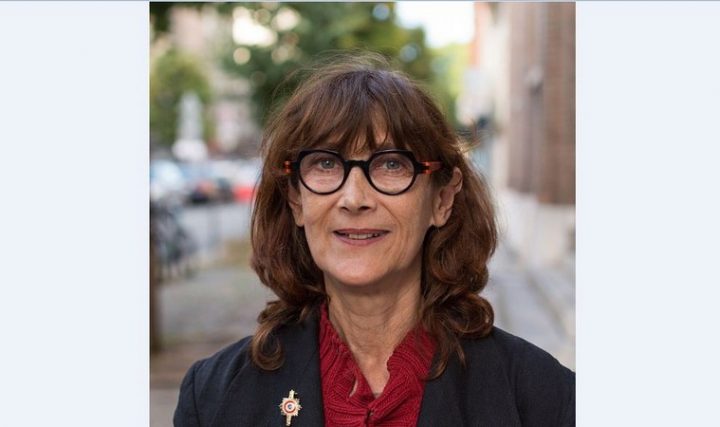Sabine Rubin is a committed woman, Siloist humanist… She has worked for many years to mobilize people around her so that they express themselves, especially on the political and social level in favour of a more human world. Currently, she adheres to the programme of France Insoumise “the future in common” and is a member of the French National Assembly.
She participated in the 2018 European Humanist Forum as a speaker at the opening session, and in the round table “Social and political convergence”.
EHF2018: The slogan of the European Humanist Forum 2018 is “What unites us towards the Universal Human Nation”. How does this idea resonate in you?
Sabine Rubin: For the idea of the Universal Human Nation to resonate in me, I have to put myself in a poetic mode. The word “nation” indeed refers to a feeling of belonging to something common, I say a feeling because it is tinged with an emotional connotation, with familiarity and with this idea of belonging. In truth, I recognize myself primarily in the French nation, which is especially familiar to me because of its culture, its language and its history. But if I place myself in a more universalist mode (which also corresponds to the most beautiful values promoted by France in certain moments of its history) the Universal Human Nation obliges me to recognize the humanity of all, and to recognize myself as part of this great human family.
For this idea to resonate, we must therefore put ourselves in a real attitude of openness to the humanity in others. Because it should be specified that the Universal Human Nation is not simply the nation of all humans, but rather the nation full of humanity, that is, where every human being considers other human beings in their full humanity as well. That is why this Universal Human Nation must be founded on humanist values.
In your opinion, what elements can unite us?
It is precisely humanist values that can unite us because these values are universal. These are nonviolence, non-discrimination, solidarity and freedom. Now, to translate these values into action, I see only one alternative: treating others as you want to be treated yourself. Let us say that this is a direction that we can give to our actions on a personal level and that could inspire relations between nations.
I said earlier that these values are universal because I believe they reflect the profound aspirations of human beings: to open up to others without fear; to live in a world without violence; to feel a sense of ownership and solidarity with others. Certainly, in these times, we must go deep inside ourselves to reconnect with these aspirations.
How would these values translate politically?
How would nonviolence, non-discrimination, solidarity and political freedom be translated? An extensive program. If each nation chose these values, they would be self-determined by the people, organized as a people, on the basis of a real, even direct democracy. These self-determined nations would work together in a spirit of solidarity and mutual cooperation. It is on this basis – and starting from the bottom – that nations would organize themselves into a confederation for a Universal Human Nation, organizational forms that respect diversity.
And of course, these nations would be nonviolent so that the Universal Human Nation would be too: this would be a nation without wars, without economic violence and, misery, hunger, the homeless would be part of the old world. I think that human beings, in the depths of their consciousness, aspire to this.
Given the state of destructuring and fragmentation of the world today, this may seem like a utopia?
Obviously, in the current context, this is the world of complete utopia. But today’s utopias may become tomorrow’s reality. So these are choices to be made; real choices. And we must work to build in this direction not because I say so, but because it is a profound aspiration of all human beings to live in a world of peace, and more generally a nonviolent world. Yes, this may seem utopian today, but it is precisely the image that peoples need, especially at a time when they are completely suffocated by globalisation and the standardisation of the current system.
This Universal Human Nation – which may seem a simple expression of desires for the old generations – already appears to the new generations as a horizon visible from a new sensibility.
A final word?
At a time when globalization is made possible by the means of communication; at a time when this globalization is based on competition, domination and the war of all against all; at a time when this globalization generates widespread misery and violence, the Universal Human Nation can truly be an image that makes it possible to give a convergent direction to the different peoples of the world.






